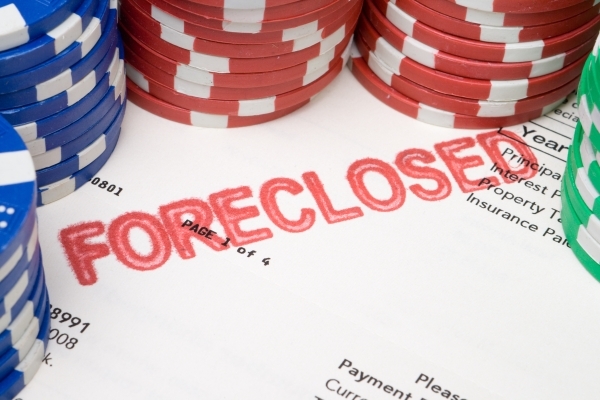Las Vegas foreclosure sales can have hidden costs

The numbers tell the story: After years as the poster-child for the foreclosure crisis, Las Vegas’ housing market is finally stabilizing. The median home price has held steady at $220,000 for four months running, and less than 7 percent of homes sold in November were bank-owned, according to the Greater Las Vegas Association of Realtors. That’s down from more than 60 percent at the height of the crisis.
Nevertheless, Nevada remains the state with the fourth-highest foreclosure rate in the nation. Some investors and first-time homebuyers are still tempted by visions of picking up a great deal on a distressed property. There can be hidden costs to buying a foreclosed home, however.
Here’s what local Realtors say you should know.
1. Profit margins on foreclosed homes aren’t as high as they were a few years ago when cash-rich investors flocked to the courthouse steps for auctions. “The banks are going to price them at market value,” says GLVAR President Keith Lynam. “And there’s enough buyer pressure here that even if they lowered the price, that would drive it up anyway.”
The median sale price of a bank-owned home in Southern Nevada was $165,700 in November, up 7 percent from a year ago. If you buy through an auction site such as Auction.com, be prepared to tack on a buyer’s premium of up to 5 percent of the purchase price.
2. Renovations can be costly. “Banks are required to fill out a disclosure, but they don’t really know what is wrong with the property,” says Scott Beaudry, a broker at Universal Realty who’s handled foreclosed properties for Fannie Mae. “With a homeowner, you’re going to know if the roof was fixed two years ago, or if there’re any issues here or there. It’s a safer deal.”
Beaudry says fewer disgruntled homeowners are stripping houses of appliances and fixtures than in the past, in part because banks are offering cash payments in exchange for leaving the home in good condition. But if a house has been vacant for a while, it could have a mold problem that’s difficult to diagnose without a thorough inspection, or have fallen victim to vandals. “There’s a due-diligence period of seven to 14 days and buyers need to use that to their advantage,” he says. “Get a professional inspector in there and get the pool checked, the roof checked, everything.”
3. Make sure there are no other liens on the property. Homeowners associations, utility companies, the Internal Revenue Service or even contractors might have also filed claims for unpaid bills, in addition to the mortgage holder. These should show up in a preliminary title report, so review it carefully.
4. Check that the homeowners association rules don’t bar you from using the property the way you want to. Beaudry says he’s seen buyers get into trouble when they tried to rent a home out, only to discover that the local HOA didn’t allow it. Even buyers who plan to live in the house might want the option to rent it out later if they move to a different city or expand their family. “You have to think about it now,” he says. “Go through those CC&Rs (covenants, conditions and restrictions) in detail to make sure the property is suitable for your needs.”
5. Be prepared to wait. Banks can take up to three or four weeks to approve an offer, says Michael Bondi of Urban Nest Realty. “We’re waiting on a bank to say yes when we could’ve gotten an offer (accepted) in a day or two from a traditional owner.” If you have to move within 45 days, a traditional sale might be your best bet.
6. You may have to deal with squatters — including some who have paid “rent” to scam artists. More and more Las Vegans are falling victim to rental scams, says Beaudry, in which an impostor poses as the landlord of a foreclosed property, collecting security deposits and even rent from trusting tenants. “I feel really bad for them because a lot of these people gave up $2,000 to $3,000 in fees or deposits. We Realtors have to be the bearers of bad news and say, ‘You got scammed.’ ” If you’re a buyer, Metro can tell you whether there have been reports of squatters in the home, and an experience Realtor can help negotiate a resolution.
The bottom line? Bargains still exist for buyers who do their homework, say Realtors. But whether you’re looking to purchase a house for yourself or as an investment, you can often get just as good a deal on a non-foreclosed property — with less hassle.